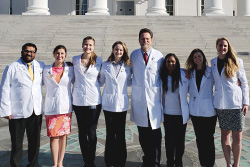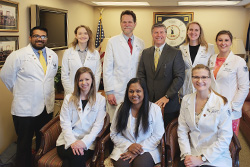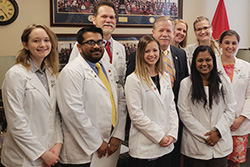Friday, February 8, 2019
LUCOM student-doctors visit Virginia’s State Capitol, participate in White Coats on Call
Fri, 08 Feb 2019Asa Keimig | LUCOM Marketing
 Liberty University College of Osteopathic Medicine (LUCOM) faculty members and student-doctors were in Richmond this past week to participate in the White Coats on Call program Lobby Day sponsored by the Medical Society of Virginia (MSV).
Liberty University College of Osteopathic Medicine (LUCOM) faculty members and student-doctors were in Richmond this past week to participate in the White Coats on Call program Lobby Day sponsored by the Medical Society of Virginia (MSV).
White Coats on Call is an annual event that the MSV hosts. Two days are planned for Virginia physicians, physician assistants, and other healthcare professionals during which time they advocate for their patients, their profession and their colleagues. The MSV also plans several medical student-specific lobby days so that small groups of students get hands-on experience in health policy and advocacy.
On Wednesday, Feb. 6, LUCOM Dean Peter A. Bell, DO, along with seven student-doctors from LUCOM attended Lobby Day in Richmond where, after a debriefing with MSV staff and physician members, they met with each of Virginia’s senators as well as two delegates to discuss proposed health policy changes. “My first engagement with advocacy was as a medical student at the University of New England when we were presented the opportunity to advance the benefits of Osteopathic medicine to public officials, interested citizens and local businessmen,” said Dr. Bell. “We are training the next generation of Osteopathic physicians to be patient advocates. The expectation of ‘it’s about the patient; applies inside and outside the exam room.”
 One of the bills that the LUCOM group showed support for aimed to amend Step Therapy requirements. Step Therapy is the process by which insurance companies minimize their costs by only covering cheaper drugs until all of the pre-approved, less-expensive options have been shown to provide no/little therapeutic benefit to the patient.
One of the bills that the LUCOM group showed support for aimed to amend Step Therapy requirements. Step Therapy is the process by which insurance companies minimize their costs by only covering cheaper drugs until all of the pre-approved, less-expensive options have been shown to provide no/little therapeutic benefit to the patient.
An example of that would be a patient is given a free trial of a new diabetic drug and this new drug really works for them. Once the trial period is over, however, they have to start the process of getting their prescription covered by their insurance. Since it’s a new and expensive drug, the patient’s insurance company denies coverage of that drug until the patient has tried multiple, cheaper options that have all failed to produce the same effect. This means that the patient does not receive efficient, effective treatment for sometimes months. If the bill is passed, patients would have better access to the drugs they need.
“I have learned from traveling to conferences for the Student Osteopathic Medical Association, as a delegate and advocate, that even one voice can implement the waves of change,” said Jessica Swavely, Class of 2021. “I have seen votes for resolutions flip due to student testimony. I have heard the passion and persistence in wanting change for physicians and patients, not only by current physicians, but greatly from the voices of the medical students.” Swavely believes there is a lot of work to do in healthcare and that by being knowledgeable in the opportunities to advocate and write resolutions is a great first-step into the future.
While student-doctors advocated for the Osteopathic profession in Richmond, they were also able to learn from delegates, state senators, and colleagues about the issues tackling the state and the country as a whole.
 “Hearing stories of those affected by the legislation that we were advocating for was incredible,” said Swavely. “We can read a reform on paper and think we truly understand it but at the end of the day it affects the patients. The testimony given by those truly affected taught me more than anything ever will about the nature of these reforms and the realistic effect they have on patients.”
“Hearing stories of those affected by the legislation that we were advocating for was incredible,” said Swavely. “We can read a reform on paper and think we truly understand it but at the end of the day it affects the patients. The testimony given by those truly affected taught me more than anything ever will about the nature of these reforms and the realistic effect they have on patients.”
Liberty medical students, through a commitment to lifelong learning, aspire to be patient advocates rising up to meet the needs within society. “Alli Dews, as a second-year student-doctor, really spearheaded the opportunity for first-years at LUCOM to advocate for the osteopathic profession,” said Anneke Bulthuis, Class of 2022. “At first, I was a little intimidated because I wasn’t aware of which senate bills were current and how to approach a Senator. Then I realized that it was something too important to let fear keep me back.”
Bulthuis served as a caregiver for her mother while she suffered from debilitating illness for over a decade. It was during that time she realized the system was deeply broken and desperately needed reform. “Too often, the mechanism of healthcare is stacked against those it is supposed to help. This is something that needs to change and physicians are uniquely positioned to push transformative initiatives forward,” she said.
“The main thing that I took away from Lobby Day is that it’s important to really get involved,” said Alli Dews, Class of 2021. “One of the physicians I work with on the ACP-Virginia Governor’s Advisory Council, Dr. Stuart Henochowicz, told me that the most important thing you can do is to show up. I had always avoided politics because I avoid conflict, but now I’ve seen that even as a student, I can make a difference by speaking directly to the legislators who have been chosen to represent me and tell them my story and my beliefs. I can influence change by showing up.”
Carl R. Hoegerl, DO, associate professor of neurology at LUCOM, attended Lobby Day in January because he views advocacy as an important piece in impacting the lives of those around him. “Physician means ‘teacher’ and if we aren’t teaching our legislators how to best form health policy then who else will? We are delivering health care on the front lines and we should be there to fight for our profession and especially our patients. I view being a physician as a profession and not just a job.”
Swavely, Bulthuis and Dews, like many LUCOM student-doctors, hope as future osteopathic physicians that they can serve their patients to the best of their ability. They all plan on continuing to advocate, working with legislators to ensure patients are protected and have access to the drugs and procedures they need to maintain their health.